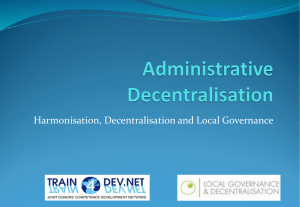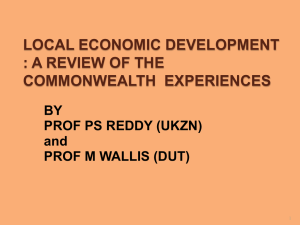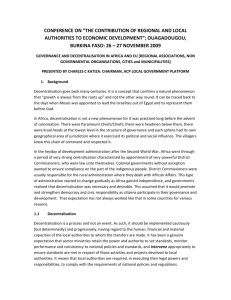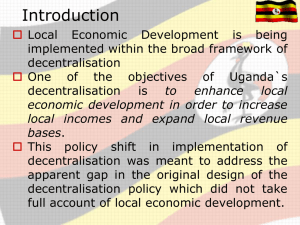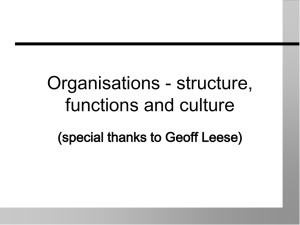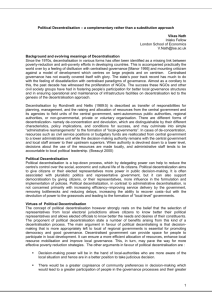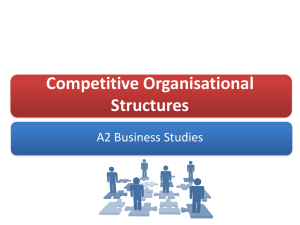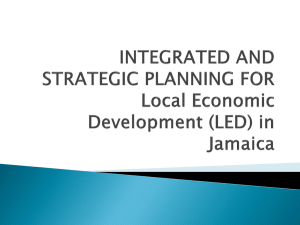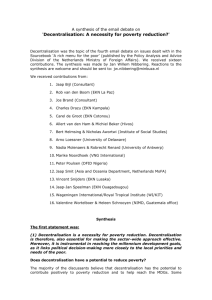REGIONAL EU SEMINAR (Nairobi, 11-14
advertisement
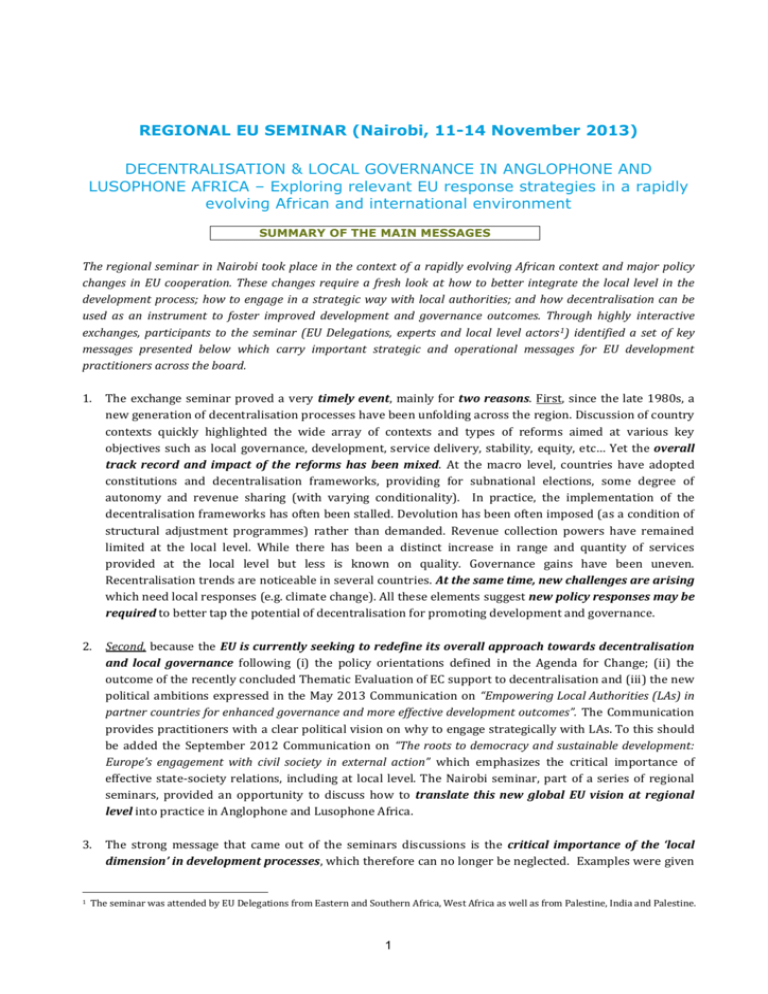
REGIONAL EU SEMINAR (Nairobi, 11-14 November 2013) DECENTRALISATION & LOCAL GOVERNANCE IN ANGLOPHONE AND LUSOPHONE AFRICA – Exploring relevant EU response strategies in a rapidly evolving African and international environment SUMMARY OF THE MAIN MESSAGES The regional seminar in Nairobi took place in the context of a rapidly evolving African context and major policy changes in EU cooperation. These changes require a fresh look at how to better integrate the local level in the development process; how to engage in a strategic way with local authorities; and how decentralisation can be used as an instrument to foster improved development and governance outcomes. Through highly interactive exchanges, participants to the seminar (EU Delegations, experts and local level actors 1) identified a set of key messages presented below which carry important strategic and operational messages for EU development practitioners across the board. 1. The exchange seminar proved a very timely event, mainly for two reasons. First, since the late 1980s, a new generation of decentralisation processes have been unfolding across the region. Discussion of country contexts quickly highlighted the wide array of contexts and types of reforms aimed at various key objectives such as local governance, development, service delivery, stability, equity, etc… Yet the overall track record and impact of the reforms has been mixed. At the macro level, countries have adopted constitutions and decentralisation frameworks, providing for subnational elections, some degree of autonomy and revenue sharing (with varying conditionality). In practice, the implementation of the decentralisation frameworks has often been stalled. Devolution has been often imposed (as a condition of structural adjustment programmes) rather than demanded. Revenue collection powers have remained limited at the local level. While there has been a distinct increase in range and quantity of services provided at the local level but less is known on quality. Governance gains have been uneven. Recentralisation trends are noticeable in several countries. At the same time, new challenges are arising which need local responses (e.g. climate change). All these elements suggest new policy responses may be required to better tap the potential of decentralisation for promoting development and governance. 2. Second, because the EU is currently seeking to redefine its overall approach towards decentralisation and local governance following (i) the policy orientations defined in the Agenda for Change; (ii) the outcome of the recently concluded Thematic Evaluation of EC support to decentralisation and (iii) the new political ambitions expressed in the May 2013 Communication on “Empowering Local Authorities (LAs) in partner countries for enhanced governance and more effective development outcomes”. The Communication provides practitioners with a clear political vision on why to engage strategically with LAs. To this should be added the September 2012 Communication on “The roots to democracy and sustainable development: Europe’s engagement with civil society in external action” which emphasizes the critical importance of effective state-society relations, including at local level. The Nairobi seminar, part of a series of regional seminars, provided an opportunity to discuss how to translate this new global EU vision at regional level into practice in Anglophone and Lusophone Africa. 3. The strong message that came out of the seminars discussions is the critical importance of the ‘local dimension’ in development processes, which therefore can no longer be neglected. Examples were given 1 The seminar was attended by EU Delegations from Eastern and Southern Africa, West Africa as well as from Palestine, India and Palestine. 1 of local level dynamics impacting positively on the delivery of public services, the creation of wealth and jobs, the equitable management of natural resources, improved accountability, etc. but these are not very generalizable. Giving power to local people may help to overcome the structural inefficiencies of the central state. The diversity of contexts in which the EUDs operate should raise caution about “best practice” reform; a country can learn from but rarely directly replicate what has been done in another has one. Attaining benefits depends on context and how rather than what implementation. 4. The main challenge encountered by decentralisation reforms in the region has been the lack of a strategic approach. The focus has been on decentralisation from the top down, building the state’s technocratic capacity while largely neglecting the bottom-up through effective civic engagement and the synergies between both set of dynamics. Decentralisation was compromised by the simultaneous introduction of other reforms (such as structural adjustment policies, multi-party democracy). Participants particularly noted that a ‘sink or swim’ approach had often been used towards LAs. Decentralisation too often takes the form of “dumping responsibilities” to the local level. Allowing LAs to develop their own mandates rather than only transferring central government responsibilities will be key in this. However, LAs are also partly to be blamed. They have often been “too passive”, accepting tutelage from the central government while neglecting to develop their own strategies. This suggests that for decentralisation to succeed deeper behavioural changes will be required at central, local and individual level. 5. This provided a link with the highly political nature of decentralisation processes, which led to lively debates. As a multi-dimensional process of state reform, the trajectory of decentralization in a given country (including its timing and sequencing) is primarily determined by the intergovernmental balance of power between the different stakeholders involved and their relative ability to bargain and shape policy design and implementation. In many countries in the region, the coalition of interests is such that decentralisation –understood as the granting of effective autonomy to local authorities to fulfil their general mandate- is blocked rather than genuinely promoted. This explains why decentralization reforms have generally not led to more autonomous local authorities. A political economy analysis is also required to understand other potential benefits of decentralisation, such as reducing corruption (this will only happen if accountability mechanisms are put in place at local level) or building citizenship (this will only occur if local populations see an interest in participating in local affairs). 6. Experts at the seminar suggested those interested in pushing for better decentralisation to: Be realistic in terms of expectations (e.g. in terms of the time required to expand local autonomy or build accountability mechanism). Primarily work with the “willing partners” at the early stages to allow the creation of a decentralisation “momentum” that may subsequently contaminate other actors. Choose the right entry points and sequencing of reform by building on the positive aspects of the system where success is more likely. Integrate the different aspects of decentralisation (i.e. administrative, fiscal and political) right from the onset even if in a basic form at first. Devolve actual responsibilities progressively according to clear criteria. Carefully balance the technical and political needs of decentralisation reforms, especially regarding adequate levels of central control and local autonomy. Invest in processes that gradually ensure greater autonomy and build effective accountability systems Make use of traditional systems where they have an added value (e.g. in terms of ensuring transparency and accountability) 2 Address the twin drivers of decentralisation reforms (the devolution of power from the central level and capacity building at the local level) simultaneously and reassess progress achieved over time. 7. Arising from this debate on the political dimensions of decentralisation, some interesting pointers for donors were also identified. First, be prepared to think and act politically. This should not be equated with “meddling” in domestic affairs but rather seen as a precondition to understand change dynamics and engage meaningfully over a longer period of time. Second, avoid parallel actions that may undermine the construction of a viable local public sector as well as legitimate LAs. This is particularly important regarding civil society (= avoid funding CSOs for functions legally due to be performed by LAs) and in sector operations (= avoid vertical approaches that exclude LAs and neglect territorial realities). Third, put aid money in “building systems” both within state institutions, at the level of civil society (e.g. in terms of ensuring their participation in the budget process) and towards citizens (even if in some countries a large majority are illiterate). 8. The need to link decentralisation to concrete development challenges (e.g. job creation) was also emphasized. This mainstreaming of decentralisation would make it “more sellable” to elites and mobilise societal interest. Particularly interesting dynamics can be observed across the region in terms of ensuring a better ‘local’ control of natural resources –with the help of specialised agencies and civil society actors. They are based on ensuring greater transparency and a more balance distribution of benefits through multi-actor dialogue processes at various levels (e.g. translating the EITI- initiative at local level). A key challenge in this respect is the empowerment of LAs to play a catalyst role in these processes as representatives of local communities and in brokering deals that are beneficial for the territory involved. 9. With regards to building the capacity of Local Authorities these should be primarily “on the job”, linked to concrete functions and tasks rather than generic classroom based trainings (if possible followed by periodic on-site follow-up). When considering how best to provide capacity support, a number of critical choices must be made (depending on the country) to elaborate a relevant mix. In this context, it is useful to keep in mind different forms of capacity building. The support can be “supply-driven” (largely managed and provided by the central government or its agents) or “demand driven” (tailored to the specific needs and requests of DLG actors). There is also a need to recognize a dual track capacity building on both the technical (training for LAs to meet their responsibilities) and governance (facilitating citizen participation, cooperation between elected officials and local staff) aspects. Strengthening the capacity for resource mobilisation at local level and representation at national/global level (through legitimate and strong national associations) was also seen as a priority. Reforms should address these at the individual, institutional and systemic level. Incentives could be created to make the local career more attractive. Finally, capacity building can be directed solely to government entities (elected and appointed officials) or also to civil society (to empower citizens to hold their local governments accountable) and national actors (to help them to assume new roles under DLG reforms). Efforts to build the capacity of central government staff in decentralizing environments to help them to modify the role they have played—often from oversight and control to facilitation and support—have also been neglected but are receiving more attention in recent years) 10. Discussions also covered the different aid modalities available to support decentralisation processes. EU staff were reminded that before looking for suitable modalities they should think about what the EC wants to achieve in the local context. Then the most appropriate modality (or mix of modalities) can be selected. The development outcome should always be the main focus (not just local governance) while simultaneously trying to increase local autonomy. Initially, depending on the level of expectations, Though 3 many operational questions were raised, there was broad consensus on the need to explore ways and means to better integrate the ‘local dimension’ and its key actors (i.e. LAs, the local public sector and civil society) into (sector) budget operations. The EU and other donors should not become “prisoners” of the aid modality. The challenge at stake is rather to promote a multi-actor and multi-level dialogue on how to construct effective synergies between central and local actors in getting better development and governance outcomes. A brief presentation was also made of new guidance prepared by DEVCO on how to use ‘smart projects’ in support of decentralisation ‘from the bottom-up’ and through ‘scaling-up’ n countries where the conditions are not conducive for centrally-led reforms and related budget support. 11. Local Economic Development (LED) is not a new topic yet it is gaining again a high profile. The issue is also closely linked to the EU’s priority of promoting ‘inclusive growth’. It is a complex field, yet LED was highlighted as one of the areas where decentralisation can efficiently be used as a tool to foster (i) wealth creation, (ii) social & economic development, (iii) local revenue generation and (iv) the implementation of national policies promoting local economic development. Key challenges include the need to further explore (i) how LED can be promoted when the macro-economic policies rely on the central government;?(ii) what LAs can really do to promote LED? (iii) how to create an enabling environment for LED?(iv) how LED can be linked to a territorial development approach? (v) how to address the issue of land reform –which in this part of the world is closely linked to LED? 12. There was quite some interest to better understand the ‘paradigm shift’ of the EU regarding civil society, as announced in the above Communication on ‘the roots of democracy and sustainable development’. The main changes include a focus on civil society as a governance actor, the need to focus on improving statesociety relations (rather than merely supporting civil society as a self-standing actor) and the preparedness of the EU to help creating an enabling environment for civil society to thrive as an actor with the necessary legitimacy, power, capacity and outreach to effectively push for reforms at national and local levels. This shift could create new opportunities for CSOs to engage in the process of building the state ‘from below’. There was demand for better understanding how the two recent EU Communications (on CSOs and LAs) could be practically combined in the field and what the implications are for the use of the various financial and non-financial instruments of the Commission. 13. The issue of fiscal decentralisation would have merited more time. The subject increasingly comes to the surface, as EU Delegations seek to integrate the local level dimension in their various (budget support) operations and work more with the local public sector (including the Las) in delivering the goods and services. Discussions underlined the need to take fiscal decentralisation out of its technical remit; to explore its practical relevance for a wider set of development constituencies (eg at sectoral level); to clarify the links between fiscal decentralisation and ensuring greater autonomy and accountability of LAs; or to find intelligent ways for donors to fund LAs directly while strengthening the intergovernmental fiscal system. 14. Looking towards the future, participants and panellists during various sessions identified possible drivers that would help to expand the real demand for decentralisation in 2014: (i) democratisation trends which create space for contestation, however the re-emergence of traditional leaders/authorities needs to be taken into account, (ii) Globalisation which has limited central governments claims of complete sovereignty over their territories, (iii) the increased use of incentives to make LAs more interesting as career options 4
